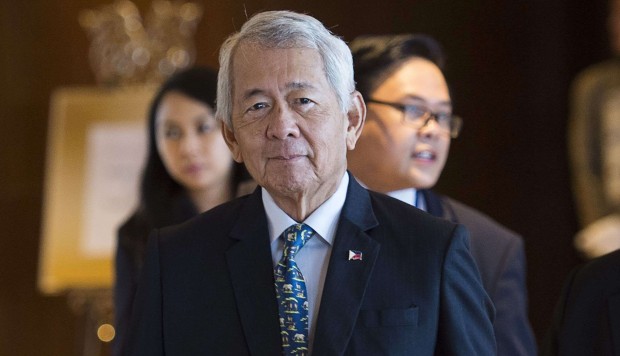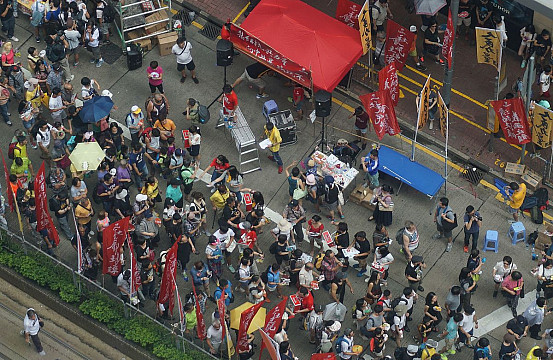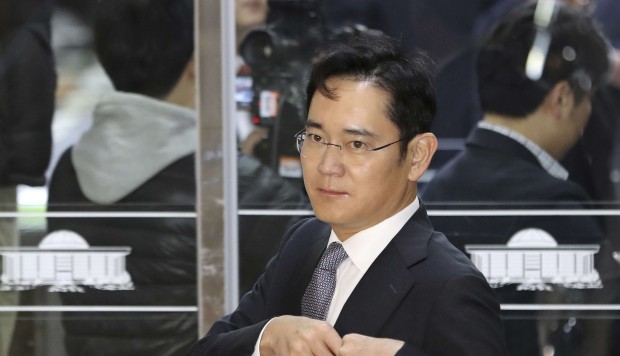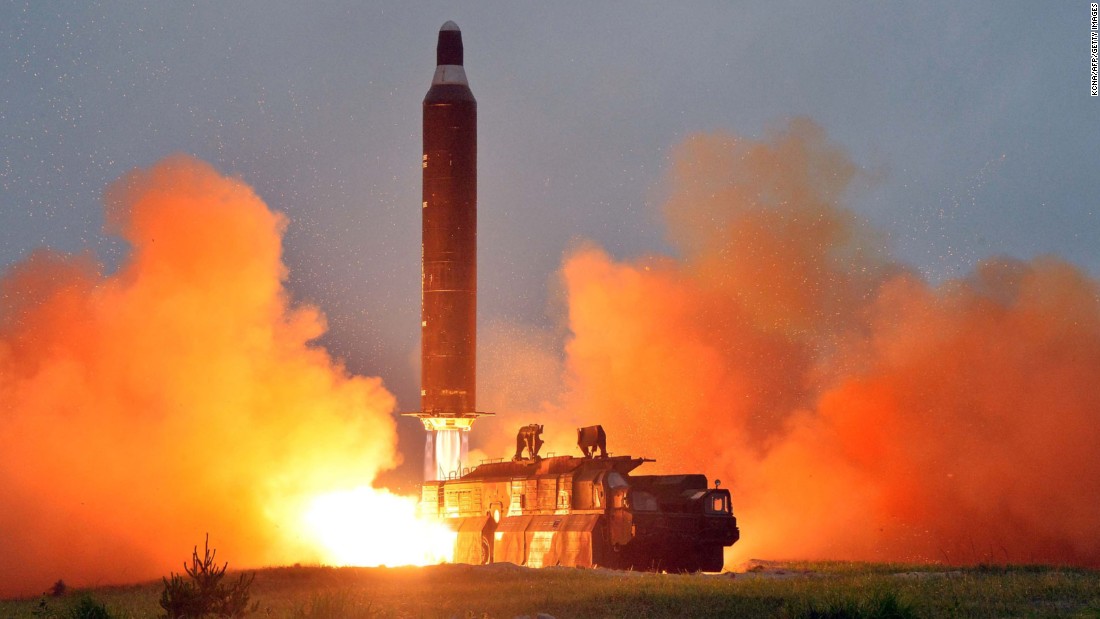Taiwan scrambles jets, navy vessels to ‘surveil & control’ passage of Chinese warships — RT News
 China’s Soviet-built ‘Liaoning’ aircraft carrier led warships through the Taiwan Strait on Wednesday, while returning from exercises in the South China Sea. Although Taiwan’s Defense Ministry stated that the carrier was not trespassing in the country’s territorial waters, it confirmed that it did enter its air defense identification zone (ADIZ) in the southwest.
China’s Soviet-built ‘Liaoning’ aircraft carrier led warships through the Taiwan Strait on Wednesday, while returning from exercises in the South China Sea. Although Taiwan’s Defense Ministry stated that the carrier was not trespassing in the country’s territorial waters, it confirmed that it did enter its air defense identification zone (ADIZ) in the southwest.
In response, the Taiwanese military quickly deployed jets and navy ships to follow the Chinese boats as they traveled through the narrow body of water which lies between Taiwan and China, Defense Ministry spokesman Chen Chung-chi said, as cited by Reuters.
Responding to China’s movements, Taiwan’s top policymaker for China affairs urged Beijing to resume dialogue with Taipei, after official communication channels were shut down by China in June.
„I want to emphasize our government has sufficient capability to protect our national security. It’s not necessary to overly panic,“ Chang Hsiao-yueh, minister for Taiwan’s Mainland Affairs Council, said during a news briefing.
„On the other hand, any threats would not benefit cross-Strait ties,“ she said. China’s Wednesday movements have led many to read the act as a statement that Beijing will back up its territorial claims to Taiwan with military means, if necessary.
Meanwhile, China has said that its ‘Liaoning’ aircraft carrier was taking part in drills to test weapons and equipment in the disputed South China Sea, adding that its movements complied with international law.
Beijing’s naval exercises have unnerved its neighbors in the region – including Taiwan, which China claims as its own – amid long-running territorial wrangles in the South China Sea. China claims most of the waters of the energy-rich disputed waterway, though Brunei, Malaysia, the Philippines, Taiwan, and Vietnam also have claims.
Taiwan’s scrambling of jets is the latest in an already tense relationship between Beijing and Taipei, and follows recent flare-ups between the two sides.
China expressed anger at Taiwan’s President Tsai Ing-wen over the weekend, after she made a controversial stopover in the US, meeting with senior Republican lawmakers in Houston, Texas.
„We firmly oppose leaders of the Taiwan region, on the so-called basis of a transit visit, having any form of contact with US officials and engaging in activities that interfere with and damage China-US relations,“ Chinese Foreign Ministry spokesman Lu Kang said on Monday, just hours after the meeting. He went on to urge “relevant US officials” to handle the Taiwan situation appropriately to avoid harming US-China relations.
China is suspicious of President Tsai, believing she wants to push for the formal independence of the island. It has warned of future turbulence if she fails to endorse Beijing’s view that Taiwan is part of China.
Last month, US President-elect Donald Trump found himself in the middle of the dispute, after accepting a congratulatory call from Tsai and questioning Washington’s commitment to Beijing’s ‘One China’ policy with Taiwan.
China and Taiwan split amid a civil war in 1949. Beijing has never renounced its threat to use force if necessary to prevent the island’s permanent independence from the mainland.
© Source: https://www.rt.com/news/373299-taiwan-jets-chinese-warships/?utm_source=rss&utm_medium=rss&utm_campaign=RSS
All rights are reserved and belongs to a source media.


 The Philippines won’t raise its recent arbitration victory against Chinese territorial claims in the South China Sea during Asian summit talks that it will host this year, Foreign Secretary Perfecto Yasay Jr. said Wednesday. Yasay said pressing last year’s ruling at the annual meetings of the Association of Southeast Asian Nations “is just simply counter-productive.” The Philippines intends to raise the ruling, which invalidated China’s historic claims under a 1982 U. N. treaty, in bilateral talks with Beijing in the future, Yasay said, stressing that the arbitration decision is final and won’t be changed by discussions at international conferences. “We are not going to raise this issue … because there is really no useful benefit,” Yasay said at a news conference. “This is a matter that we will be raising with China at some future time in bilateral talks and to do and involve others in the discussion of this decision is just simply counter-productive for our purposes.” “Now if any country would like to pursue their respective claims against China with respect to a disputed territory in the South China Sea, they can do so and perhaps use the decision of the arbitral tribunal as a precedent-setting case in pursuing the matter,” he said. The Philippines was previously one of the most vocal critics of China at the annual ASEAN meetings as Beijing asserted its vast territorial claims in the South China Sea. After China took control of disputed Scarborough Shoal in 2012 and blocked Filipinos from the rich fishing area, then President Benigno Aquino III brought his country’s territorial disputes with Beijing to international arbitration. China ignored the Philippine case and refused to recognize the outcome, which was heavily in favor of the Philippines. President Rodrigo Duterte, who succeeded Aquino in June, has taken dramatic steps to mend strained relations with China. He has also taken an antagonistic stance against the administration of outgoing President Barack Obama after the U. S. leader criticized his deadly crackdown on illegal drugs. As host of the ASEAN meetings this year, the Philippines is in a position to influence their focus and the joint communiques issued at the end of the conferences. China, the U. S. and Russia and other Western and Asian nations will join expanded meetings later in the year. Yasay said the Philippines will push for the faster completion of a long-delayed “code of conduct” between China and ASEAN to discourage aggressive actions that could ratchet up tensions in the South China Sea, a busy waterway for world trade. The Philippines wants the framework of the nonaggression pact to be completed within the first half of this year, Yasay said. The prospects for the signing of a legally binding regional code remain unclear. Philippine diplomats have said negotiations over the code have been stalled in the past by China while it covertly turned disputed reefs into artificial islands which can now be used by Beijing to better defend its territorial claims.
The Philippines won’t raise its recent arbitration victory against Chinese territorial claims in the South China Sea during Asian summit talks that it will host this year, Foreign Secretary Perfecto Yasay Jr. said Wednesday. Yasay said pressing last year’s ruling at the annual meetings of the Association of Southeast Asian Nations “is just simply counter-productive.” The Philippines intends to raise the ruling, which invalidated China’s historic claims under a 1982 U. N. treaty, in bilateral talks with Beijing in the future, Yasay said, stressing that the arbitration decision is final and won’t be changed by discussions at international conferences. “We are not going to raise this issue … because there is really no useful benefit,” Yasay said at a news conference. “This is a matter that we will be raising with China at some future time in bilateral talks and to do and involve others in the discussion of this decision is just simply counter-productive for our purposes.” “Now if any country would like to pursue their respective claims against China with respect to a disputed territory in the South China Sea, they can do so and perhaps use the decision of the arbitral tribunal as a precedent-setting case in pursuing the matter,” he said. The Philippines was previously one of the most vocal critics of China at the annual ASEAN meetings as Beijing asserted its vast territorial claims in the South China Sea. After China took control of disputed Scarborough Shoal in 2012 and blocked Filipinos from the rich fishing area, then President Benigno Aquino III brought his country’s territorial disputes with Beijing to international arbitration. China ignored the Philippine case and refused to recognize the outcome, which was heavily in favor of the Philippines. President Rodrigo Duterte, who succeeded Aquino in June, has taken dramatic steps to mend strained relations with China. He has also taken an antagonistic stance against the administration of outgoing President Barack Obama after the U. S. leader criticized his deadly crackdown on illegal drugs. As host of the ASEAN meetings this year, the Philippines is in a position to influence their focus and the joint communiques issued at the end of the conferences. China, the U. S. and Russia and other Western and Asian nations will join expanded meetings later in the year. Yasay said the Philippines will push for the faster completion of a long-delayed “code of conduct” between China and ASEAN to discourage aggressive actions that could ratchet up tensions in the South China Sea, a busy waterway for world trade. The Philippines wants the framework of the nonaggression pact to be completed within the first half of this year, Yasay said. The prospects for the signing of a legally binding regional code remain unclear. Philippine diplomats have said negotiations over the code have been stalled in the past by China while it covertly turned disputed reefs into artificial islands which can now be used by Beijing to better defend its territorial claims.
 Amnesty International has released its Hong Kong Annual Report reviewing the human rights of Hong Kong over the past year. It states that the city’s human rights situation has rapidly deteriorated in recent times and is at its worst levels since the handover back to Chinese rule in 1997.
Amnesty International has released its Hong Kong Annual Report reviewing the human rights of Hong Kong over the past year. It states that the city’s human rights situation has rapidly deteriorated in recent times and is at its worst levels since the handover back to Chinese rule in 1997. 
 The price of bitcoin fell by around 10 percent after Chinese authorities announced plans to inspect bitcoin enterprises.
The price of bitcoin fell by around 10 percent after Chinese authorities announced plans to inspect bitcoin enterprises. 
 BEIJING — For generations, the “Eight-Year War of Resistance Against Japanese Aggression” has been ingrained in the minds of Chinese schoolchildren. Revolutionary hymns evoked the bloody years, from 1937 to 1945, of what is known outside China as the Second Sino-Japanese War. Documentaries denounced Japan ’s “eight years of belligerence.”
BEIJING — For generations, the “Eight-Year War of Resistance Against Japanese Aggression” has been ingrained in the minds of Chinese schoolchildren. Revolutionary hymns evoked the bloody years, from 1937 to 1945, of what is known outside China as the Second Sino-Japanese War. Documentaries denounced Japan ’s “eight years of belligerence.” 
 Samsung heir Lee Jae-yong has become a criminal suspect in a widening probe into the corruption and influence-peddling scandal engulfing the impeached , prosecutors said Wednesday. Lee, vice chairman of Samsung Electronics and the son of the Samsung Group chairman Lee Kun-hee, would be quizzed as a “suspect” in connection to bribery, prosecutors said. “We have decided to question Lee tomorrow morning… as a suspect,” Lee Kyu-Chul, spokesman for the team of special prosecutors investigating the scandal, told reporters. The affair centres on , who is accused of using her ties to Park to coerce top firms into “donating” tens of millions of dollars to two non-profit foundations which Choi then used as her personal ATMs. Samsung was the biggest contributor to the foundations. It is also accused of separately giving millions of euros to Choi to bankroll her daughter’s equestrian training in Germany in a bid to curry favour. Prosecutors have for months questioned Lee and other senior Samsung officials. The officials reportedly argued that although they were coerced to offer money, they sought no favours in return and thus the payments were not a bribe. Spokesman Lee said prosecutors “left open the possibility” of formally arresting the Samsung scion later. Prosecutors are investigating whether Samsung bribed Choi in order to win state approval for a controversial merger which it sought in 2015. The merger of two Samsung group units – Cheil Industries and Samsung C&T – was seen as a crucial step towards ensuring a smooth third-generation power transfer to Lee Jae-yong. It was criticised by many, who said it wilfully undervalued Samsung C&T’s stocks. But the National Pension Service (NPS) – a major Samsung shareholder – voted in favour of the deal and it eventually went through. Prosecutors have raided multiple Samsung offices as well as the NPS in connection with the scandal. The fund – the world’s third largest pension fund – is overseen by the welfare ministry. A former welfare minister was arrested last month for allegedly pressuring NPS officials to vote in favour of the Samsung deal. Park, who stands accused of colluding with Choi to extract money from the firms, was impeached by parliament last month but denies any criminal wrongdoing. The Constitutional Court is currently reviewing the validity of her impeachment. Choi is on trial for charges including coercion and abuse of power.
Samsung heir Lee Jae-yong has become a criminal suspect in a widening probe into the corruption and influence-peddling scandal engulfing the impeached , prosecutors said Wednesday. Lee, vice chairman of Samsung Electronics and the son of the Samsung Group chairman Lee Kun-hee, would be quizzed as a “suspect” in connection to bribery, prosecutors said. “We have decided to question Lee tomorrow morning… as a suspect,” Lee Kyu-Chul, spokesman for the team of special prosecutors investigating the scandal, told reporters. The affair centres on , who is accused of using her ties to Park to coerce top firms into “donating” tens of millions of dollars to two non-profit foundations which Choi then used as her personal ATMs. Samsung was the biggest contributor to the foundations. It is also accused of separately giving millions of euros to Choi to bankroll her daughter’s equestrian training in Germany in a bid to curry favour. Prosecutors have for months questioned Lee and other senior Samsung officials. The officials reportedly argued that although they were coerced to offer money, they sought no favours in return and thus the payments were not a bribe. Spokesman Lee said prosecutors “left open the possibility” of formally arresting the Samsung scion later. Prosecutors are investigating whether Samsung bribed Choi in order to win state approval for a controversial merger which it sought in 2015. The merger of two Samsung group units – Cheil Industries and Samsung C&T – was seen as a crucial step towards ensuring a smooth third-generation power transfer to Lee Jae-yong. It was criticised by many, who said it wilfully undervalued Samsung C&T’s stocks. But the National Pension Service (NPS) – a major Samsung shareholder – voted in favour of the deal and it eventually went through. Prosecutors have raided multiple Samsung offices as well as the NPS in connection with the scandal. The fund – the world’s third largest pension fund – is overseen by the welfare ministry. A former welfare minister was arrested last month for allegedly pressuring NPS officials to vote in favour of the Samsung deal. Park, who stands accused of colluding with Choi to extract money from the firms, was impeached by parliament last month but denies any criminal wrongdoing. The Constitutional Court is currently reviewing the validity of her impeachment. Choi is on trial for charges including coercion and abuse of power.
 US Defense Secretary Ash Carter said Tuesday that if launches do not pose a risk to the US or an ally, „it may be more to our advantage… to gather intelligence from the flight. “
US Defense Secretary Ash Carter said Tuesday that if launches do not pose a risk to the US or an ally, „it may be more to our advantage… to gather intelligence from the flight. “ 
 The December 9 impeachment of South Korean President Park Geun-hye has created a vacuum of political leadership in South Korea. Normally, the South Korean president would lead a full court press to confirm President-elect Donald Trump’s commitment to the U. S.-ROK security alliance and coordinate a consistent approach to the growing North Korean nuclear threat.
The December 9 impeachment of South Korean President Park Geun-hye has created a vacuum of political leadership in South Korea. Normally, the South Korean president would lead a full court press to confirm President-elect Donald Trump’s commitment to the U. S.-ROK security alliance and coordinate a consistent approach to the growing North Korean nuclear threat. 
 „Ban was greatly surprised by the news, which he learned from the media. He knows nothing about it, “ Ban’s spokesman, Lee Do-woon, said.
„Ban was greatly surprised by the news, which he learned from the media. He knows nothing about it, “ Ban’s spokesman, Lee Do-woon, said. 
 The South Korean cosmetics industry has been hit hard in the Chinese market after 19 of its products failed to meet the country’s import guidelines, a move that is believed to be China’s reply to Seoul for allowing the US to deploy a T erminal High Altitude Area Defense (THAAD) system.
The South Korean cosmetics industry has been hit hard in the Chinese market after 19 of its products failed to meet the country’s import guidelines, a move that is believed to be China’s reply to Seoul for allowing the US to deploy a T erminal High Altitude Area Defense (THAAD) system. 
